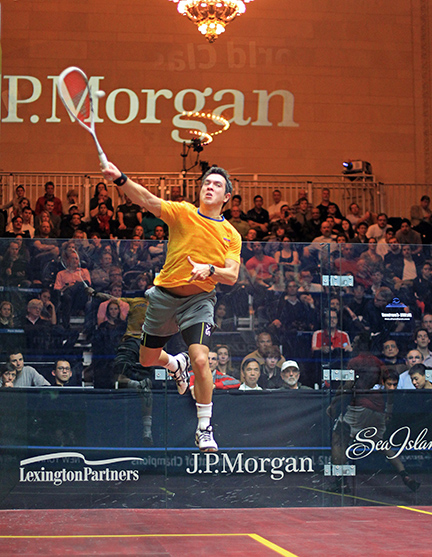
By Richard Millman
Recently I hosted one of my intensive training weekends at Meadow Mill Athletic Club in Baltimore.
In the course of the program, one of my students—an eminent lawyer who trains young lawyers—posed an interesting question to me.
His question was prompted by my assertion that the most important priority of a human being in both life and in squash is survival.
He couched his question (as I remember it) as follows: “Richard, when I teach my young lawyers, I tell them that in order to win you have to do more than merely survive. How do you answer that?”
It was a well-taken question and gave me the opportunity to explore the concept of survival. It also highlighted, once again, what a powerful and potentially dangerous tool language can be.
In answer, I said, “Well, it depends on how you are defining survival.”
He nodded for me to continue—and I wondered if he had allowed a modern concept of subsisting to color his concept of survival. “If,” I continued, “there was a lion and a leopard fighting for survival, they would each do whatever they had to do in order to survive and to come out as the victor.” My lawyer student immediately nodded.
Survival in the arena of conflict is about making decisions that lead to your ultimate success. In nature, success means staying alive in the first instance. After that we have the luxury of choice—provided our choice primarily ensures our own continued existence.
In squash, which is simply a modern conflict, the same is true. Every decision you make must abide first and foremost by the necessity of survival. All attacking shots must be played from a level of comfort where the desire to damage the opponent is never of greater consideration than your own security. All technique must relate to the consequences of that behavior in regards to your survival in the rally/game. Thus, advising a player of the best way to hit a ball is not only incorrect, but incomplete and damaging—because it fails to describe the reason and consequences to the striker, for the striking of the ball.
When I was a child, my mother used to become frustrated by myopic behavior and chide me by saying, “Your trouble Richard is that you can’t see the wood (small forest) for the trees.”
And so it is in squash (and life). We must not become so focused on the trees (individual components of the game) that we cannot see the forest (the purpose of the combined and logical use of the components to produce the most beneficial complete game).
What is the above mentioned “forest?” Our ultimate survival/success at the expense of our opponent. Let them be the one who self-destructs and dies.
You choose life and survive.





